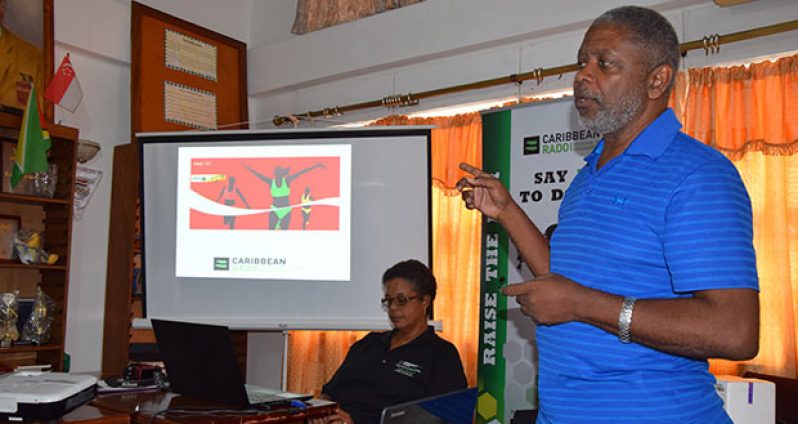IN ITS bid to bring more awareness to the issue of doping in sports, the Guyana Olympics Association (GOA), which has been hosting anti-doping education sessions every Saturday for the past five weeks, yesterday held a special session for media operatives at Olympic House on High Street.The sessions are part of a continuous effort to get all stakeholders in the sports arena involved in the fight against doping in Guyana, even as the one-year ban on Guyanese cyclist Alanzo Greaves is about to end in November.
The sessions are being conducted by Doping Control Officer (DCO) Charles Corbin and Guyana’s Caribbean (Regional Anti-Doping Organisation (RADO) Board member Dr Karen Pilgrim, and include informative segments such as ‘What is Doping’, ‘Why Athletes Dope’, ‘Why Doping is Banned’ and the ‘Challenges faced in bringing about Anti-Doping Awareness’.
Persons attending the sessions are also given a walkthrough of how the doping tests are conducted and the rights that athletes have when a test is being conducted on them.
Doping tests are carried out on urine samples taken from the athlete in the presence of a chaperone or DCO. The athletes themselves deposit and seal the containers in which the sample is transported to the lab where the tests are conducted. The samples are marked by a number and no information about the athlete is known to those who conduct the test..
Guyana currently has four DCOs certified to conduct doping tests. Apart from Pilgrim and Corbin, there are Dr Clive Bowman and Dr Navin Rambarran. Doping tests can be conducted in and out of competition, and is usually conducted on all national teams leaving Guyana to participate internationally.
Thus far, Pilgrim noted a total of 90 persons from varying sporting disciplines across Guyana have attended the workshops on Saturdays, where two sessions are held – one at 11:00hrs and another at 12:30hrs.
Each session lasts only one hour. Pilgrim noted that some sports fraternities have been more responsive than others, but in the effort to ensure awareness is as widespread as possible, the sessions will continue as long as is necessary.
Though the cases of doping in Guyana are few and far between, it has always been the opinion that more awareness and education needed to be done since ignorance of the law is no excuse; so athletes taking banned substances unknowingly will not be spared. Greaves was handed down the ban, which runs from November 1, 2015 to November 1, 2016, by the World Anti-Doping Agency (WADA), after one of his urine samples tested positive for testosterone, a well-known banned substance.
Greaves case followed that of Gumendra ‘The Golden Boy’ Shewdas, Guyana’s first Under-18 Sub-Junior World Powerlifting gold medallist, who in January 2014 was banned by the International Powerlifting Federation (IPF) after failing an in-competition doping control test conducted in August 2013.
GOA conducting Anti-Doping workshops
SHARE THIS ARTICLE :
Facebook
Twitter
WhatsApp




.png)









